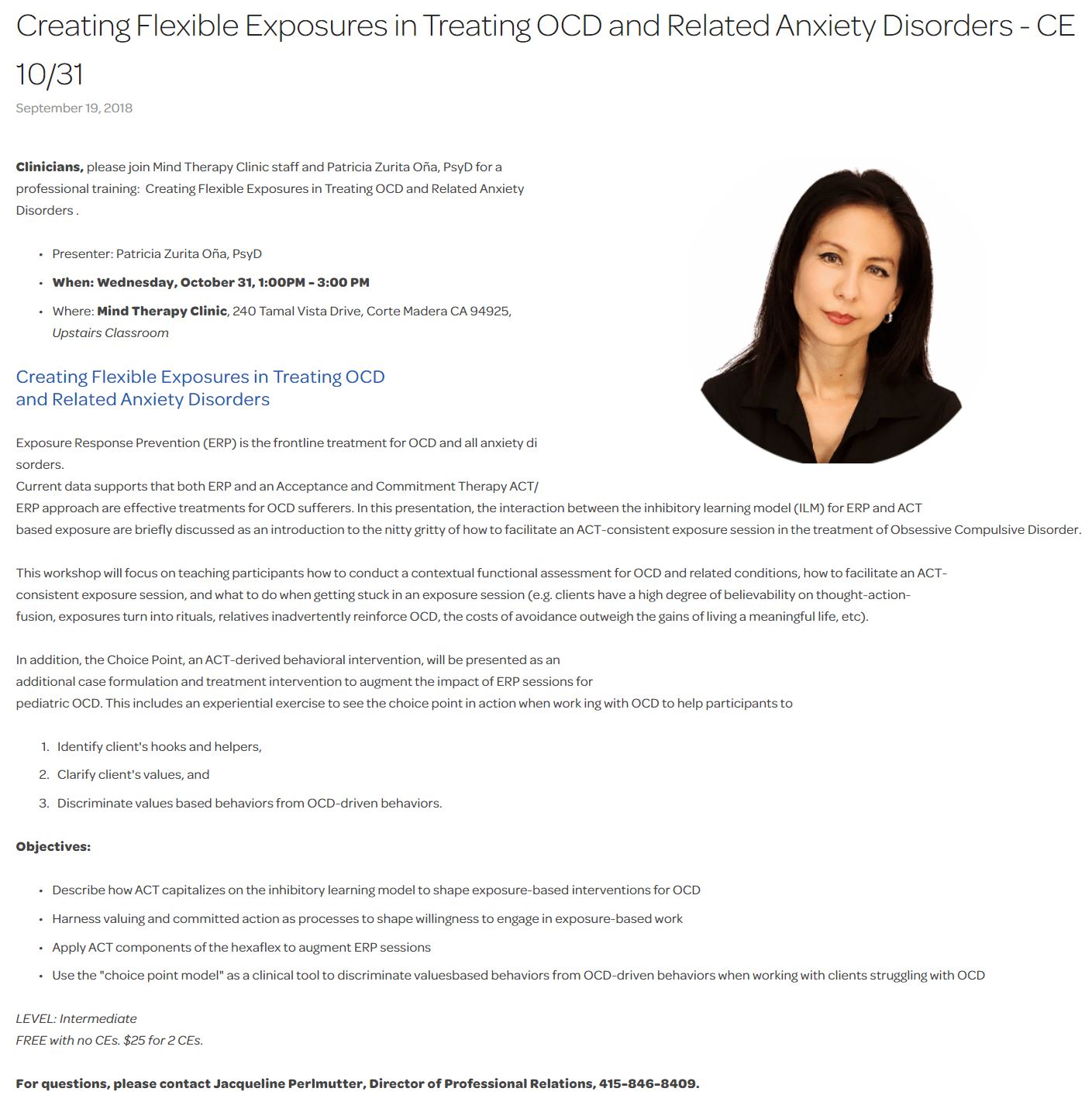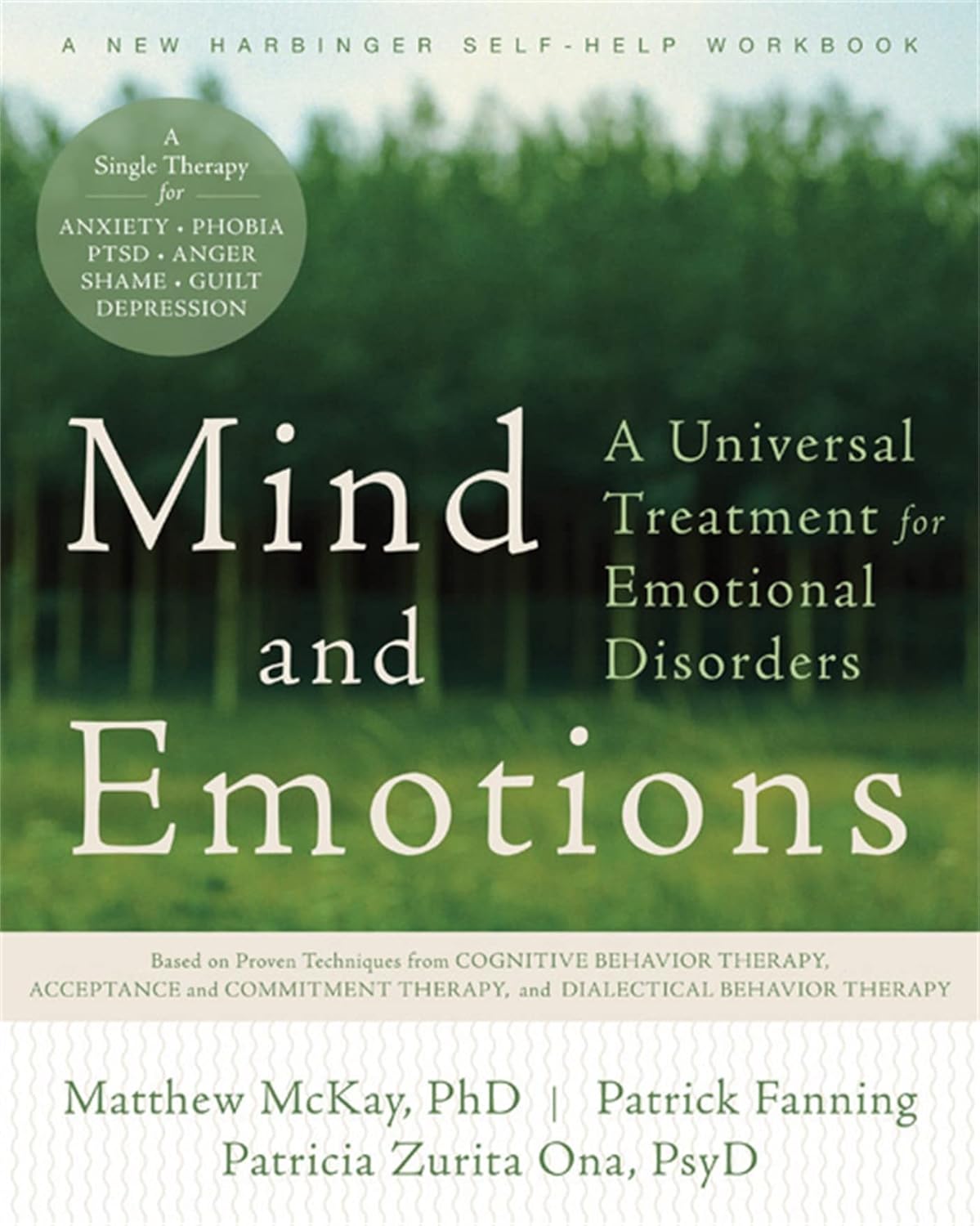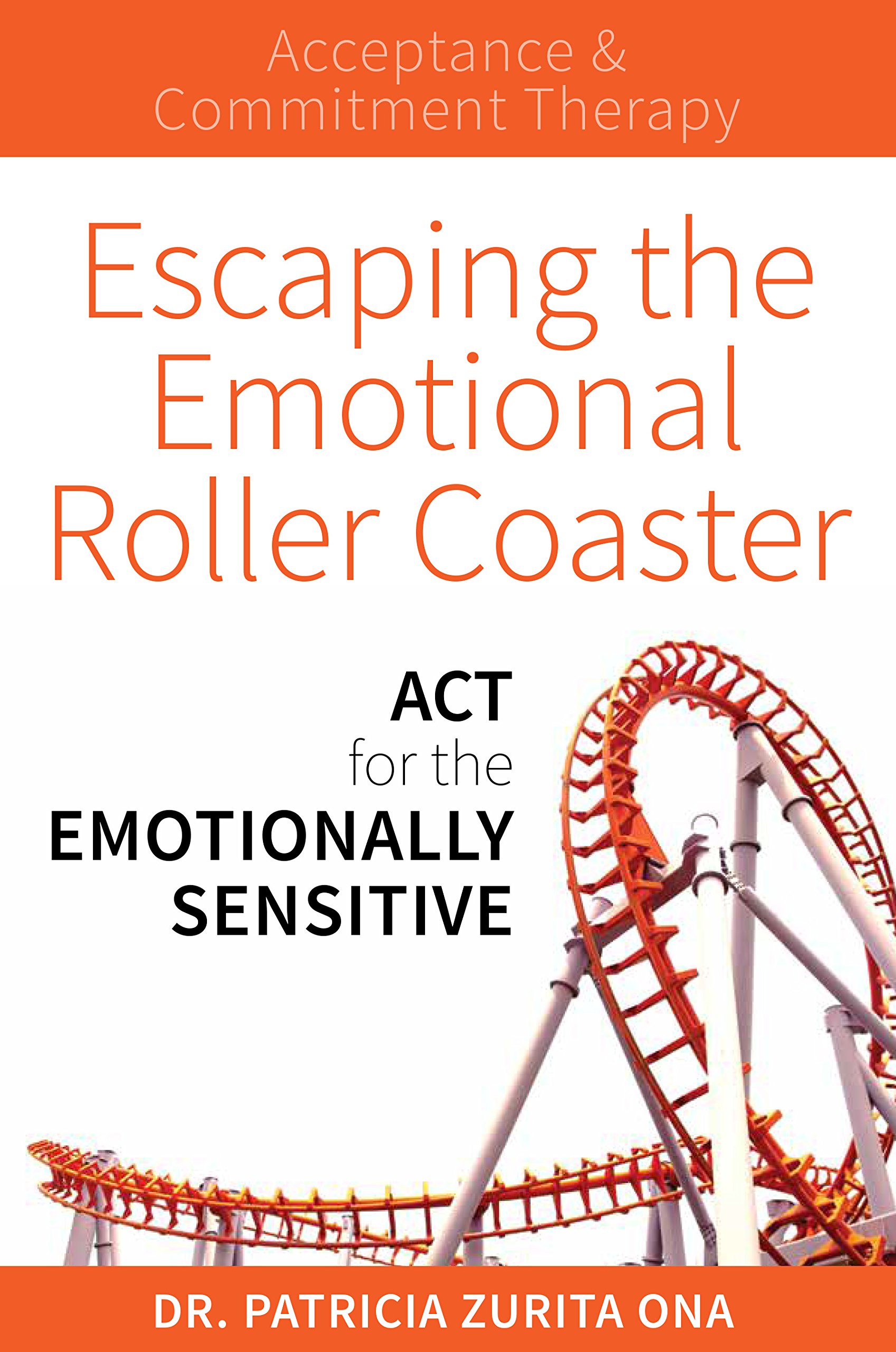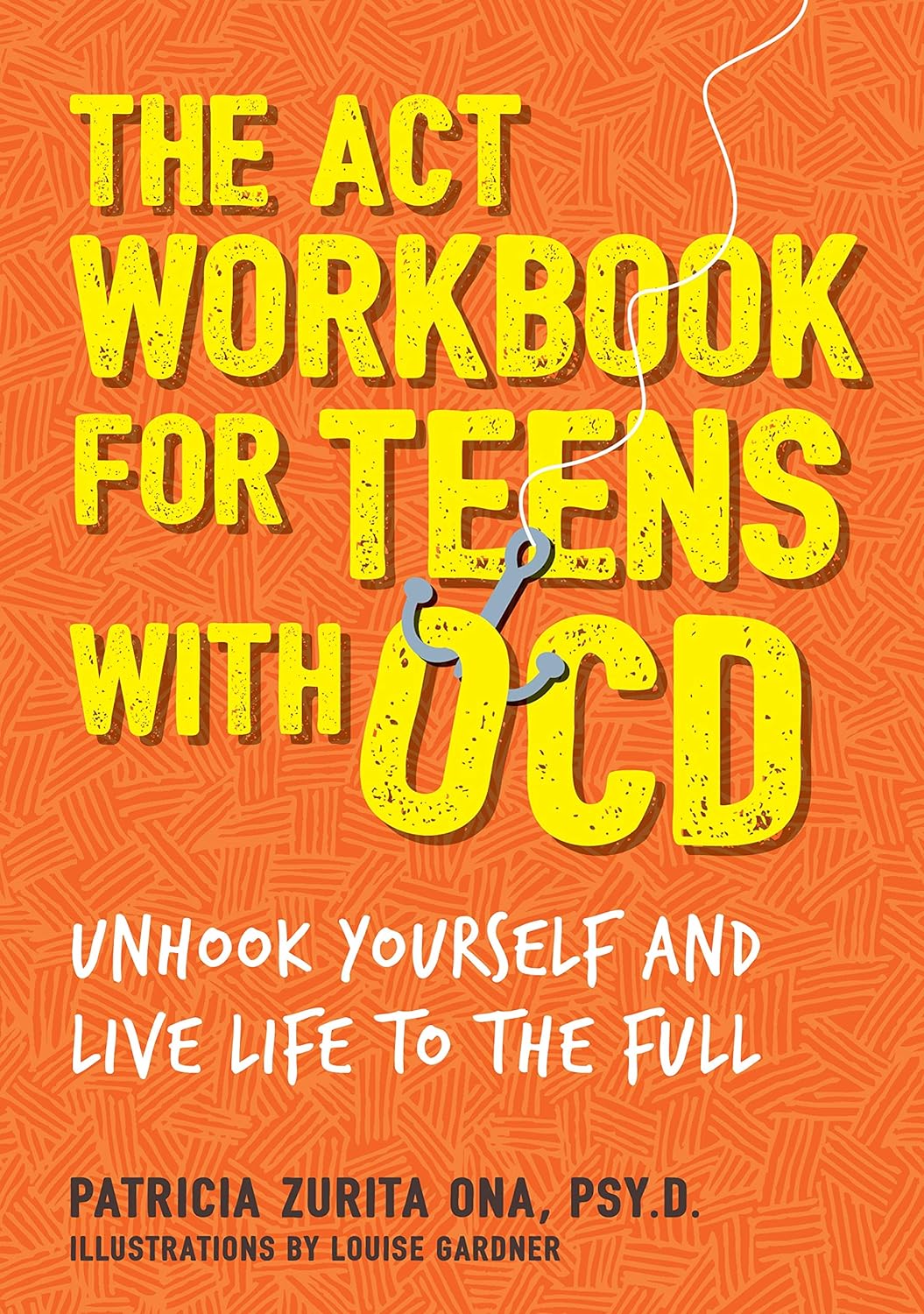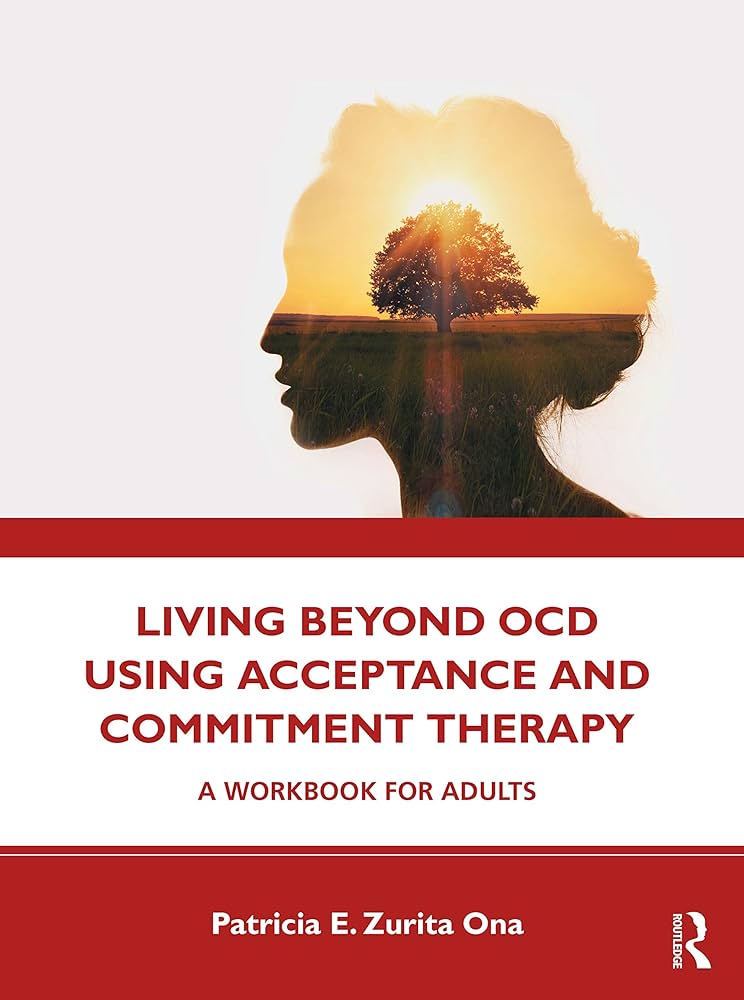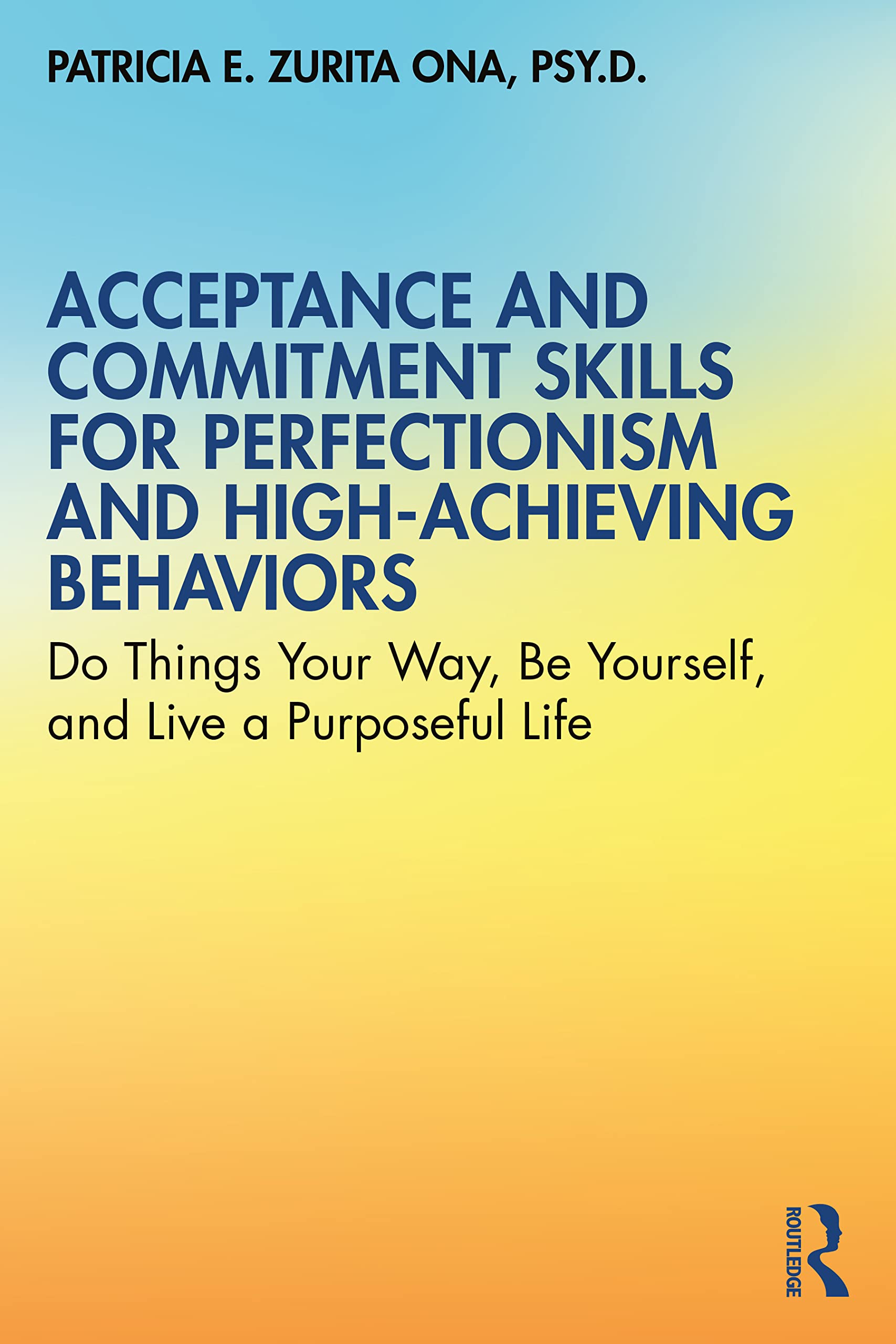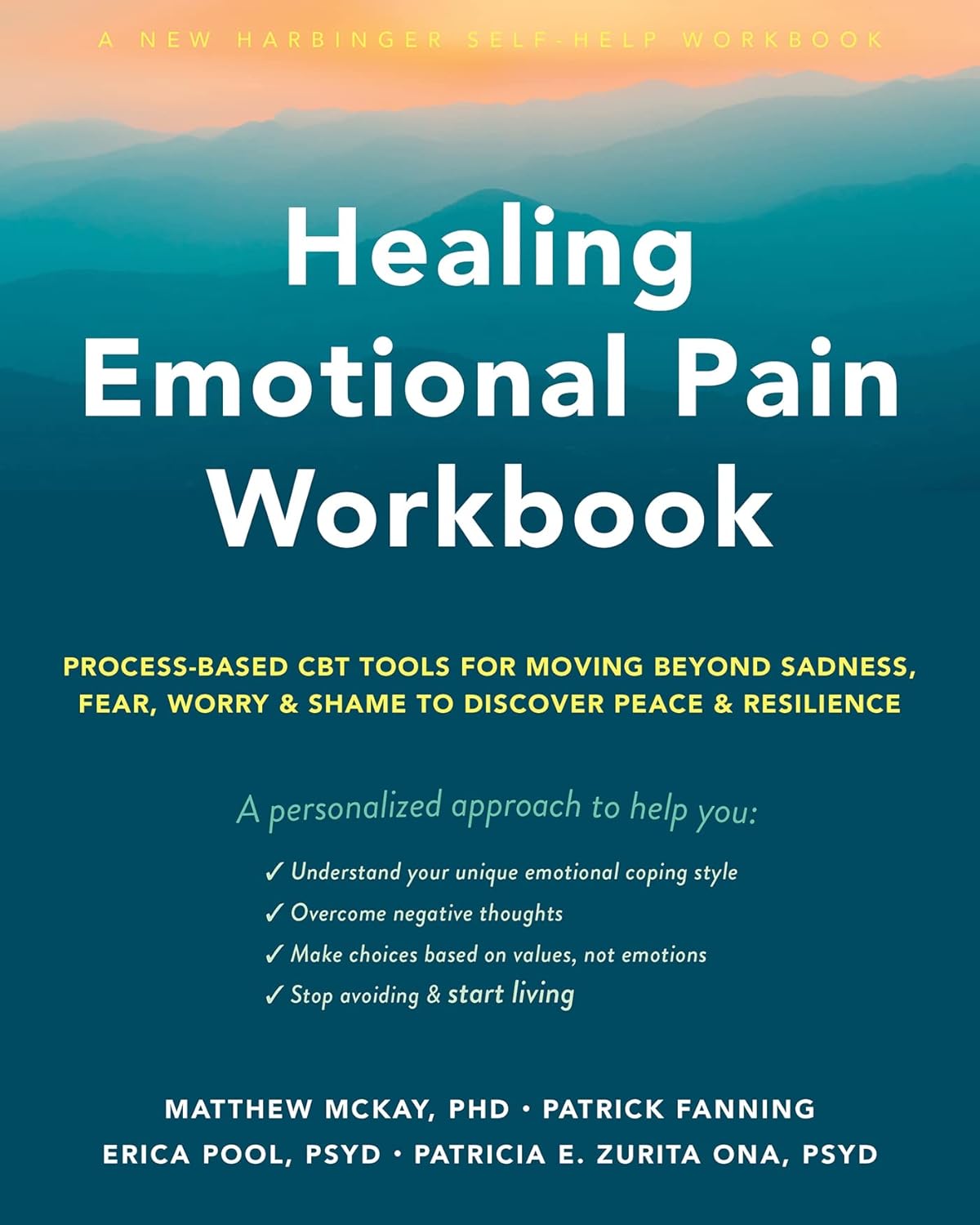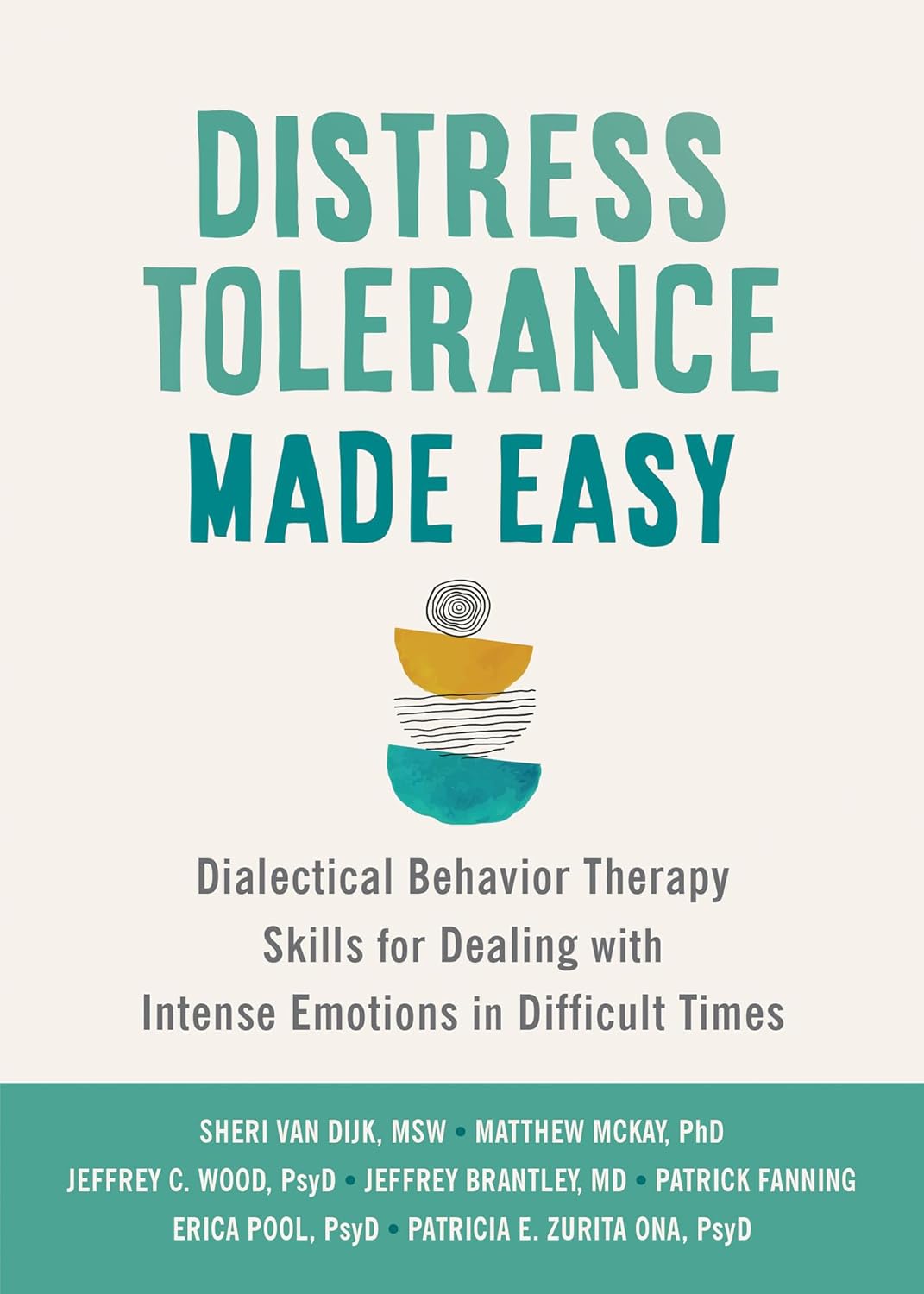GET trained
workshops
We are passionate about sharing with clinicians what has worked for us in our work with clients so you don’t feel stuck in your clinical work. Over the years we have been teaching doctoral students, colleagues, and other professionals interested in expanding their expertise on empirically-supported treatments including Cognitive Behavior Th erapy (CBT), Exposure Response Prevention (ERP), or Acceptance and Commitment Therapy (ACT).
Our workshops are experiential by nature, which means that we teach you an intervention, we show you how it looks like in session, and you have a chance to practice it so we can give you feedback right away.
We deliver workshops, in-service training, and presentations on a regular basis in the community, at national and international conferences, and will be pleased to develop a curriculum that targets your clinical interests or specific interventions for the population you work with.
2019: ACTifying your exposures for OCD

Acceptance and Commitment Therapy (ACT) has been shown to be effective for the treatment of clients struggling with Obsessive-Compulsive Disorder (Twohig, M., Abramowitz, J., 2018). Thus, understanding the application and integration of exposure-based strategies within ACT is essential for effective ACT clinical work. This workshop will go deeply into the nuts and bolts of how to conduct an ACT consistent exposure session, starting with a contextual-functional assessment of OCD symptoms, organizing a values-based exposure menu, increasing clients’ willingness to get out from their fear-based zone and move into values-based exposures, and troubleshooting when getting stuck in an exposure session (e.g. clients have a high degree of believability on thought – action – fusion, client hopes that obsessions will go away, clients’ exposures turn into rituals, etc). In addition, the Choice Point, a behavioral intervention derived from ACT will be presented as an additional case formulation and treatment intervention to augment the impact of ERP sessions for pediatric OCD. And experiential exercise will be facilitated to see the choice point in action when working with OCD and help participants to (1) identify client’s hooks and helpers, (2) clarify client’s values, and (3) discriminate values-based behaviors from OCD-driven behaviors.
Details: March 28-31, 2019 at Sheraton Grand Chicago, Chicago, Illinois
For more details, visit here.
2019: Same or Similar? ACT and Inhibitory Learning Approaches to Exposure/Response Prevention for Pediatric OCD

Description of workshop training: Exposure and Response Prevention (ERP) is the frontline treatment for youth with OCD and anxiety disorders, and recent studies have significantly added to the conceptual understanding of its mechanisms and clinical applications. Research stemming from the inhibitory learning model (ILM) has shifted exposure treatments from fear habituation to fear tolerance. Specifically, findings emphasize that learning during ERP and long-term treatment outcomes are maximized by varying stimuli across exposures, varying settings in which exposures are conducted, varying the difficulty level of exposures, emphasizing tolerance of anxious or distressed feelings instead of habituation, and focusing on discrepancies between expected and actual outcomes of exposure. Exposure from an ACT perspective is about learning to develop a more flexible relationships with feared stimuli in ways that allow individuals to take action towards their values while incorporating all ACT processes into their life (acceptance, cognitive defusion, contact with the present moment , and perspective taking). Recent reviews suggest that both the ILM and ACT approaches to exposure are effective for treating OCD (McGuire and Storch, 2018; Bluett et al, 2014), though individual treatment response may vary across approaches. In this interactive workshop, presenters will discuss the similarities and differences between the two approaches (including their putative mechanisms of change). Presenters will also demonstrate the process of conducting exposures for youth with OCD from each theoretical model’s perspective using illustrative case examples. Further, presenters will review patient characteristics that tend to indicate using one approach over the other. In addition, the Choice Point, a behavioral intervention derived from ACT, will be presented as a case formulation and treatment tool to augment the effects of ERP for children and adolescents struggling with OCD.
When: March 28-31, 2019, at Sheraton Grand Chicago
For more information, click here.
2018: Creating flexible exposures for OCD and anxiety disorders
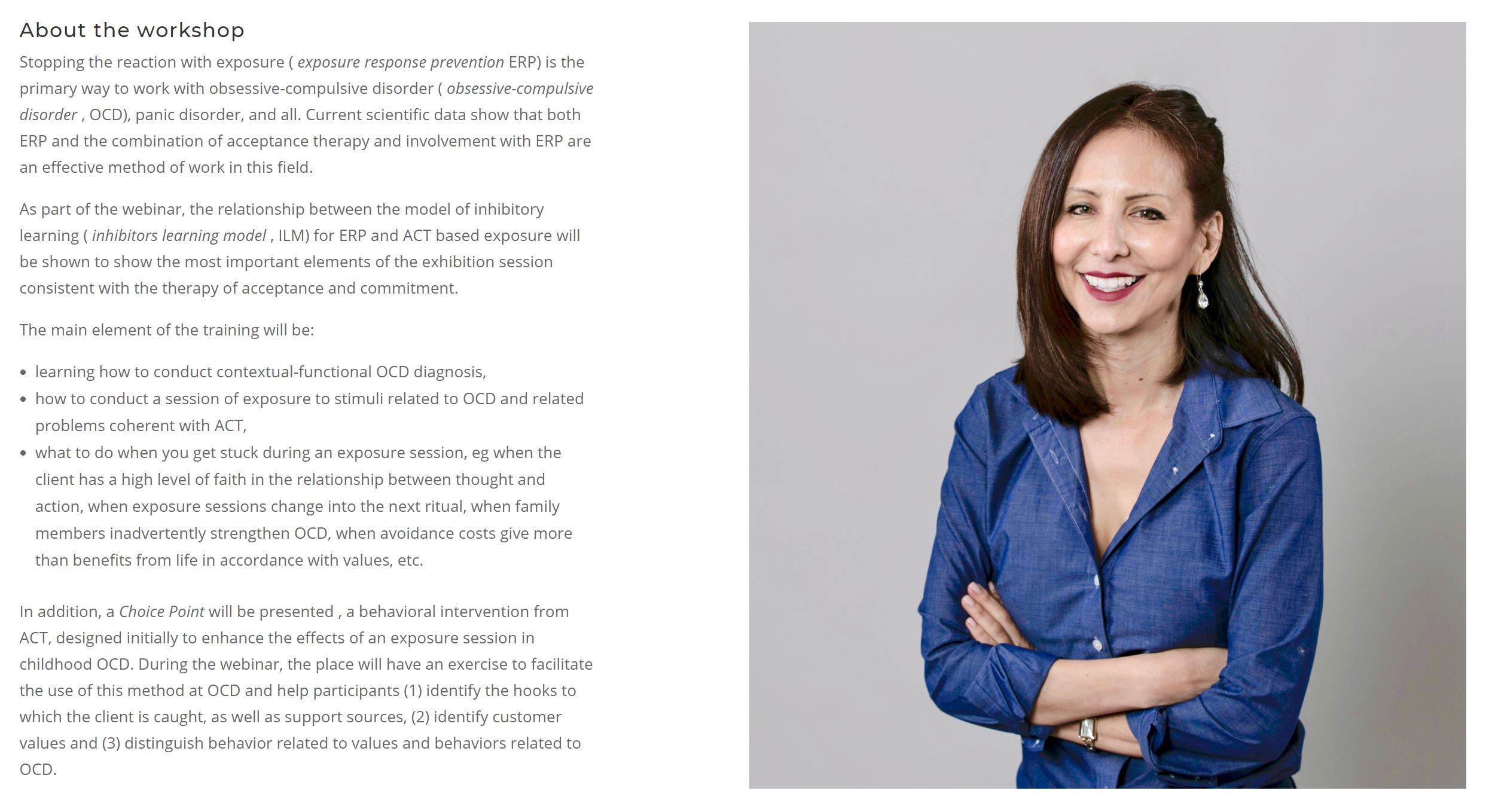
This 4-hour workshop, held for Polish clinicians, introduces intermediate ACT therapists to using exposure-response prevention for OCD and anxiety disorders in an ACT-consistent way.
The training goals include
- Describe how ACT puts a lot of emphasis on the inhibitory learning model when arranging OCD exhibition interventions.
- Workshop participants will learn how to influence values and activities involved – processes shaping readiness to engage in work based on the exhibition.
- Participants will learn to apply elements of 6 ACT processes to enhance the display sessions.
- Participants will learn how to use the ” choice point ” model as a clinical tool that allows to separate behaviors related to values from OCD-driven behaviors when working with clients struggling with such problem
The training’s details can be found here.
2018: ACT-based exposure for OCD and other anxiety disorders
2018: IOCDF: Support for Parents around OCD
At the 25th Annual OCD Conference, Dr. Z led a bilingual 1.5-hour workshop for parents of kids with OCD to provide support and parenting tools.
The presentation for parents or caregivers focused on discussing the ups and downs of parenting children and teens struggling with OCD, and how to support them through different stages of treatment. Through a brief didactic presentation, experiential exercises, and open conversations parents checked the workability of their parenting behaviors when dealing with OCD episodes at home.
2018: IOCDF: Support for Parents around OCD
At the 25th Annual OCD Conference, Dr. Z presented alongside Drs. Alec Pollard, Michael Twohig, and Jennifer Cullen on differentiating between traditional exposure therapy and an ACT-based exposure model.
The description for this 1.5-hour presentation is below:
A recent randomized clinical trial comparing ACT/ERP and ERP with adult clients struggling with OCD has demonstrated that both treatments are effective for symptom reduction, maintenance of treatment gains at post-treatment, 1 and 3-months follow up. Despite this data clinicians are faced with the challenge of figuring out which clients will benefit from a traditional behavioral exposure versus an ACT-based exposure. In order to facilitate a clinical conversation about this matter, a clinical case will be presented demonstrating how shifting approaches was necessary to maximize treatment outcomes. Next, specific questions will be addressed: (1) what’s the clinical criteria to start with traditional ERP or ACT/ERP; (2) what’s the mechanism of change within each approach?
2018: Acceptance and Commitment Therapy for Emotional Regulation
Clinicians joined Mind Therapy Clinic staff and Patricia Zurita Oña, PsyD for ACT for Emotion Regulation training event.
- Presenter: Patricia Zurita Oña, PsyD
- When: Wednesday, May 9, 10:30 AM – 12:30 PM
- Where: Mind Therapy Clinic
ACT for Emotional Regulation
ACT is based on the premise that normal cognitive processes distort and enhance the experience of unpleasant emotion, leading clients to engage in problematic behaviors designed to avoid or attenuate those unpleasant emotions. Avoidant behavior patterns can hinder and prevent client movement toward valued goals and place the client in harmful situations. ACT focuses on facilitating the client’s movement toward a more valued and personally fulfilling life, in a context in which previously obstructive unpleasant emotions no longer serve as obstructions.
Objectives:
- Conceptualize emotion regulation problems from an Acceptance and Commitment Therapy perspective (ACT)
- Identify specific ACT competences for the treatment of emotion regulation problems.
- Distinguish similarities and differences between ACT and other empirically-based treatments for emotion regulation problems
- Understand the integration of emotion science, affective neuroscience, and acceptance and commitment therapy in the conceptualization and treatment of emotion regulation problems.
2018: ADAA: from super-feelers to super-choosers
She got very positive reviews on this talk:
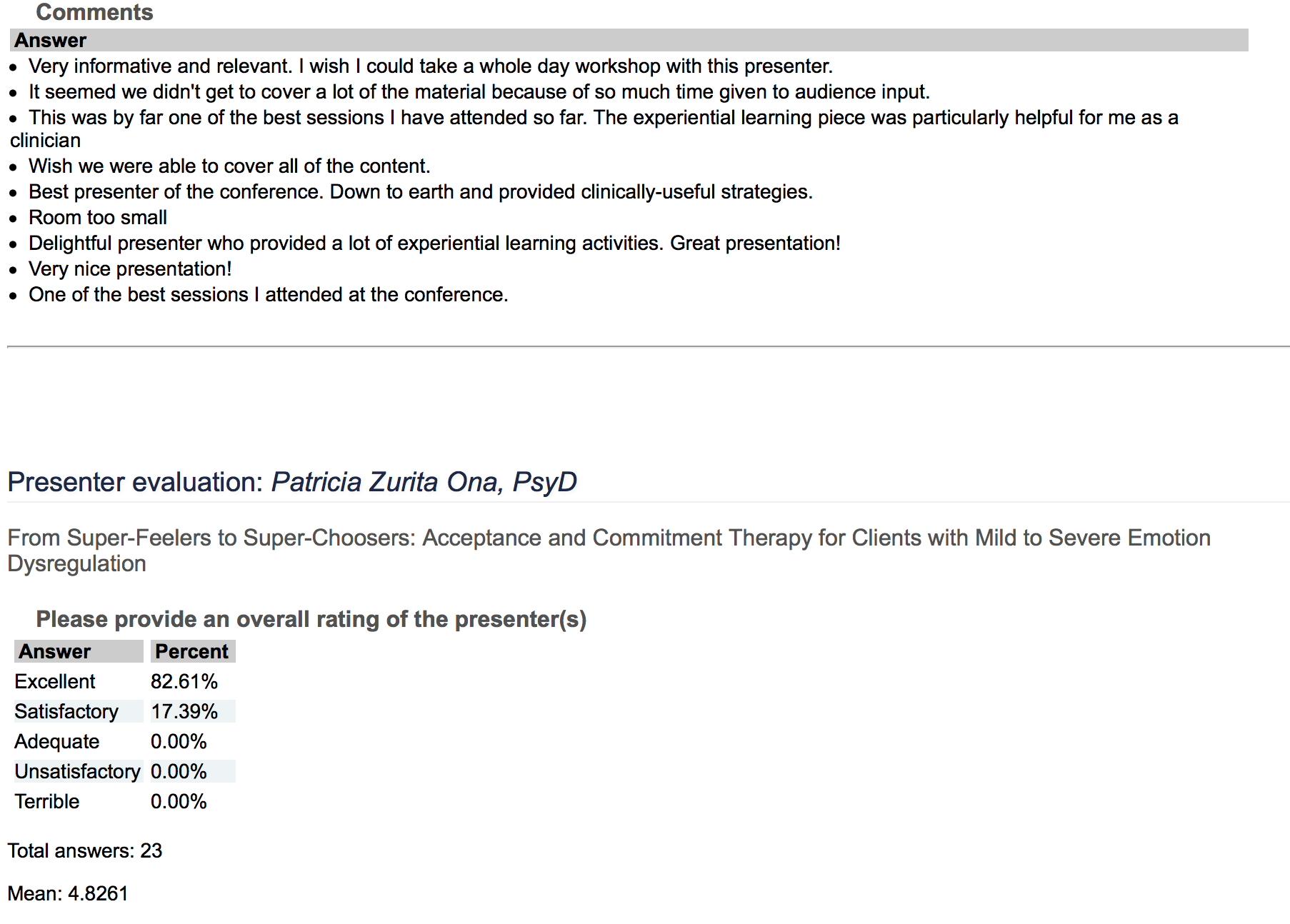
2018: ADAA: Emotion Regulation in Action
2018: ADAA: ACT group treatment for parents
2018: ACT parent training for troubled teens
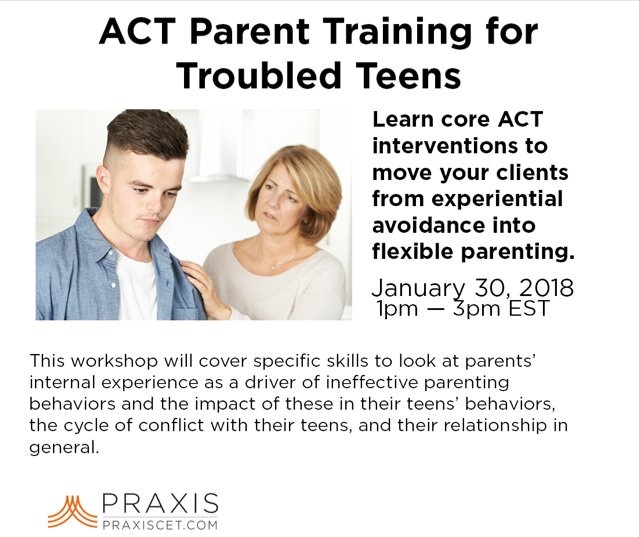
2018 ACT, ERP, OCD, and treatment interfering behaviors
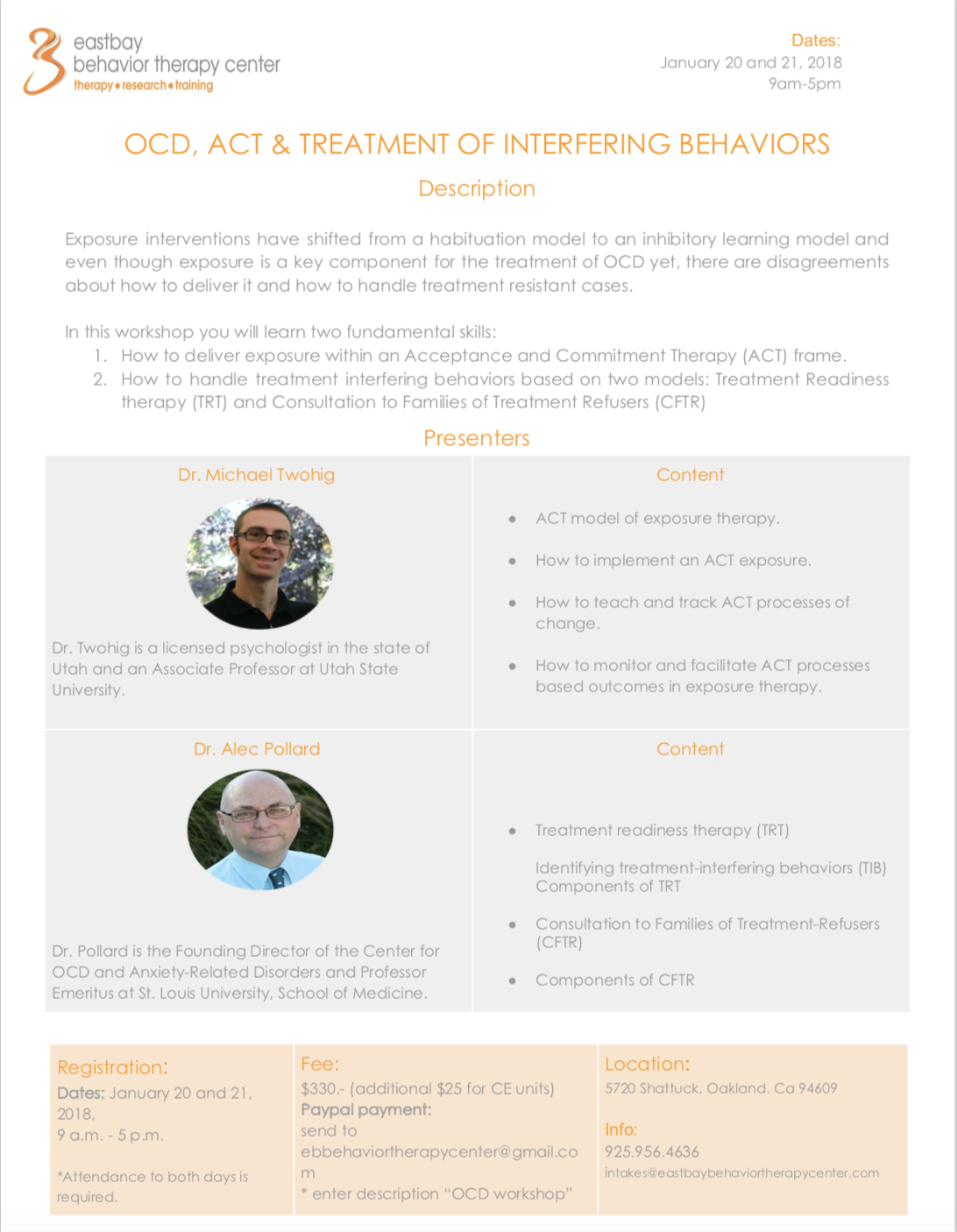
2017 DBT Intensive Training
We’re excited to announce an intensive 10-day DBT training with one of the most knowledgeable and down-to-earth DBT trainers, Charles Swenson, M.D. This intensive training will be hosted at our home, the Bay Area. Please see the details below and keep in mind that (1) you won’t have to travel, (2) this training will prepare you for your DBT certification, and the most important thing: (3) you will learn from one of the best. Let’s supercharge our DBT skills!
Dates:
Part I: February 27 – March 3, 2017.
Part II: September 11 – September 15, 2017
Facilitator:
Charles Swenson, M.D. is an inspiring teacher who brings DBT to life with clinical examples and demonstrations. Having published numerous articles and book chapters on the uses of DBT in treating borderline personality disorder, he recently published his book “DBT Principles in Action: Acceptance, Change, and Dialectics.” (http://
Cost:
Full price $2,300 per person (10-day training).
Discounted Price for Teams of 3 or more (20%): $1,840 per person.
Student Price (Graduate Students in MH Professions): $1,200 per person.
CE: $ 40.- for all participants
Registration:
Click here: http://eastbaybehaviortherapycenter.com/get-scheduled-clinicians/
Closes on January 15, 2017 or when space fills.
Please send an e-mail to kim.ebbtc@gmail.com with the subject: intensive DBT training and provide her with your name, e-mail, and phone number so you can be contacted within 48-hours for registration purposes. You can also call us at 925.956.4636
Special Features of this Comprehensive Training:
Telephone consultation to individuals/teams between Parts1 and 2 with Dr. Swenson to address implementation and practice problems. Daily demonstrations by Dr. Swenson of DBT individual therapy, group skills training, and consultation team. Teaching of the DBT skills as presented in the revised edition of the skills manual.
Refund/cancellation policy:
Registration payment is non-refundable.
2017 ACBS: It's not my fault, it's not his fault: ACT 101 for parents of emotionally dysregulated teens
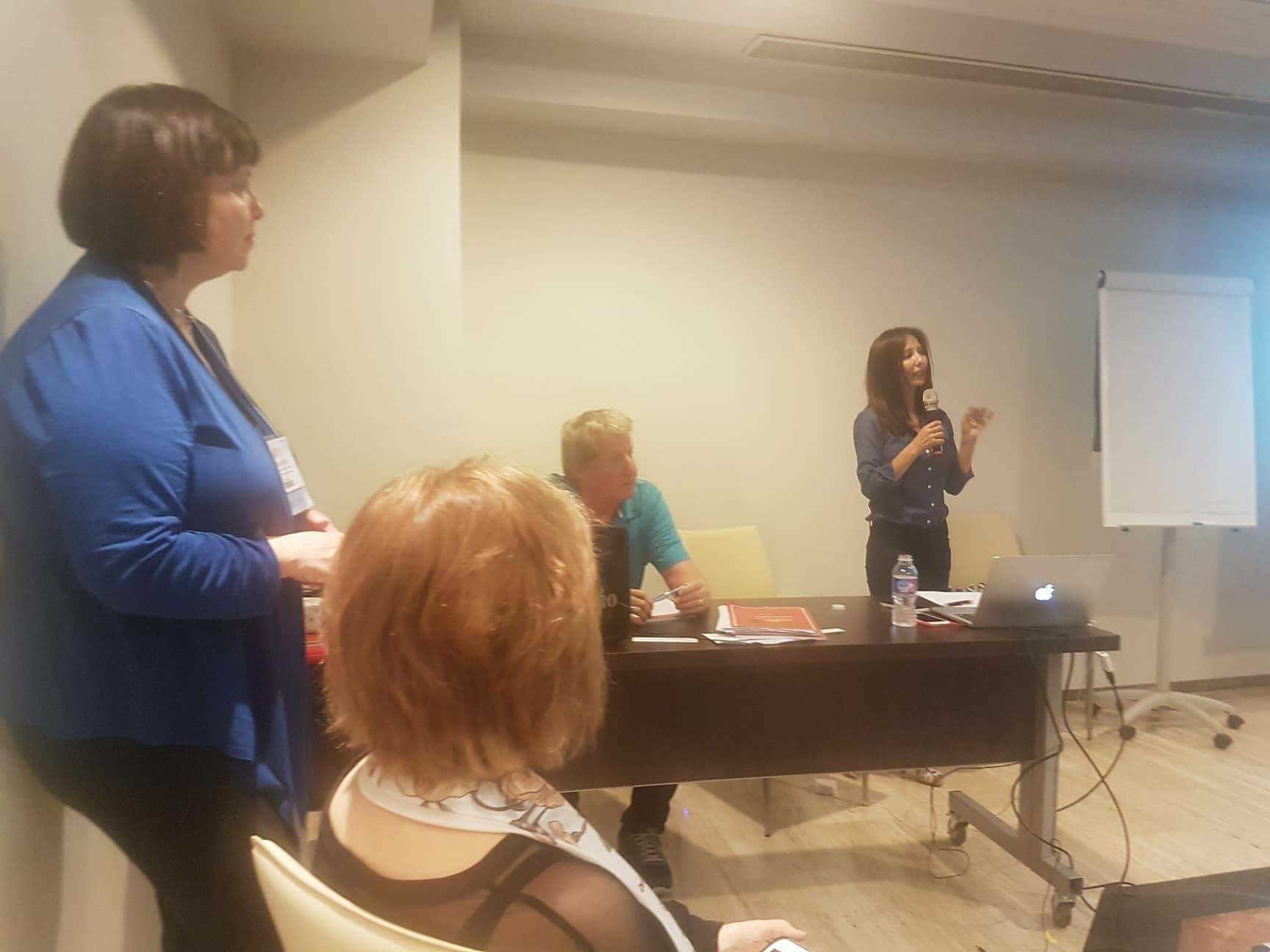
In this presentation Dr. Z helped parents identify their most common responses to their emotional pain that arose in response to teens, and to notice and address their reactions and experiences before taking action. She also showed parents ways to think about how their responses fit into the their relationship with their teen, and to re-engage with their parenting values.
2017: ACBS: The Treatment of Anxiety Disorders: Where are we succeeding and where are we falling short?
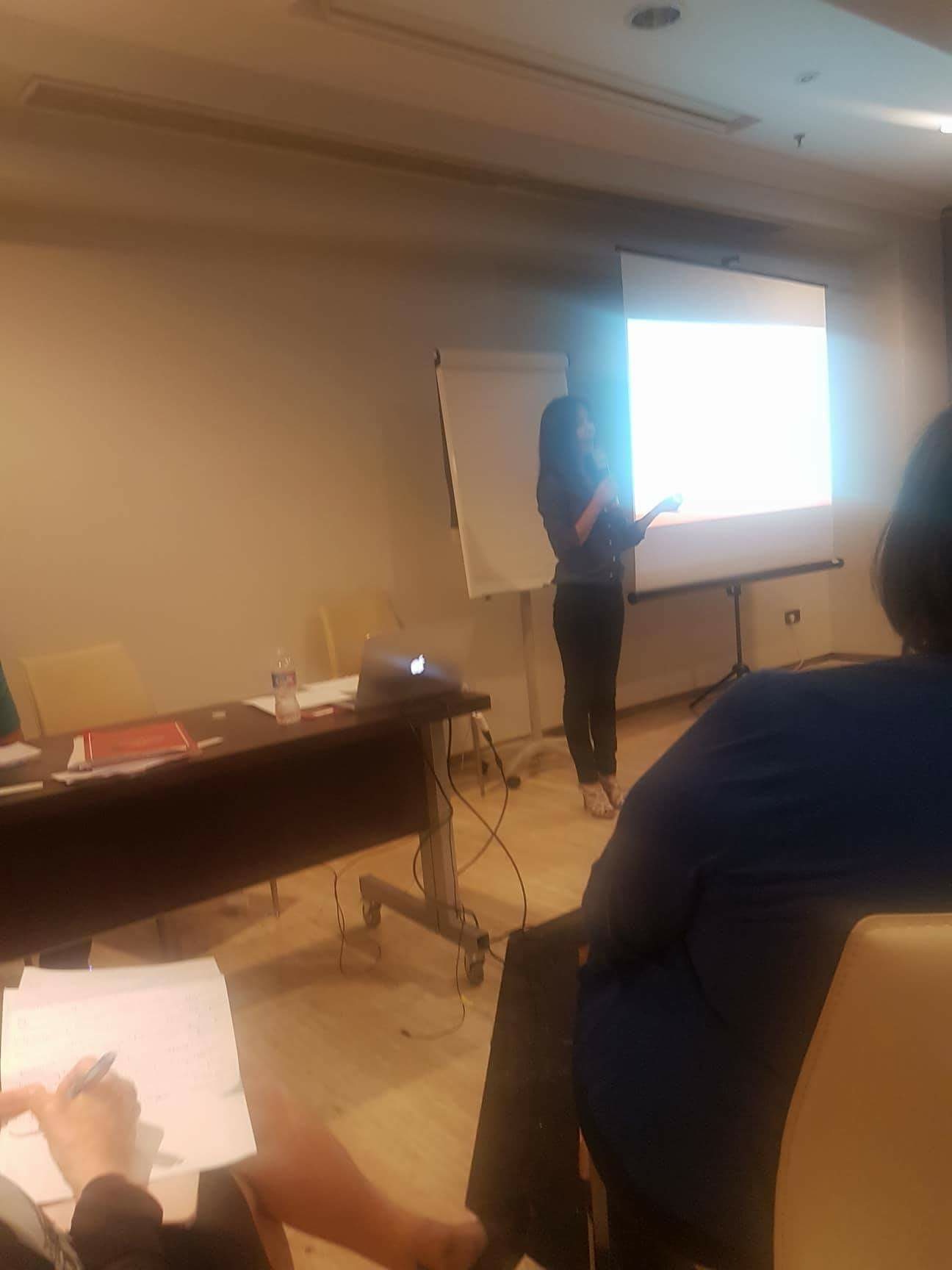
In this panel, Dr. Z spoke to her evidence-based knowledge of how anxiety disorders develop and are maintained. She explained how new research informs and shapes our understanding and treatment of anxiety disorders, and also described the research needs of the field. She was joined in the panel by Dr. Gloster, Dr. Luciano Soriano, and Dr. Meuret, with facilitation by Dr. Michael Twohig.
August 2015: ACT from moment-to-moment
Dear Colleagues,
Please select “clinicians” from the cover page; then from the top menu select “get schedule, and then select the option “workshop.”
More information: 925-956-4636 or e
www.
Phone/Fax: 925-956-4636
June 2015: Compassion Focused Therapy for Shyness
Compassion Focused Therapy for Shyness and Social Anxiety Disorder: Compassionate Social Fitness
This workshop is primarily focus on compassion-based interventions to work with clients with chronic negative self-concept, negative stories, self-blame and even self-hate.
This introductory course will introduce participants to the basic ideas and interventions used in Paul Gilbert’s Compassion Focused Therapy (CFT) integrated into Dr. Henderson’s protocol, Cognitive Behavioral Treatment for shyness and social anxiety disorder called Social Fitness Training. CFT teaches clients ways to cultivate self-compassion and to mindfully develop healthier relationships with difficult emotions. We will explore the roots of compassion in an evolutionary theory of attachment and emotion regulation. Through experiential exercises, role-plays, and didactic instruction, participants will learn how developing the compassionate mind can help individuals to experience positive, affiliative emotions, face painful feelings, and establish a secure base.
Facilitator: Dr. Lynne Henderson
Date/Time: June 13th, 9:30 to 5:30 p.m.
Location: New Harbinger Publications (Oakland)
Ce’s: 7.
Registration: www.eastbaybehaviortherapycenter.com
Please select “clinicians” from the cover page; then from the top menu select “get schedule, and then select the option “workshop.”
Fee: $140.- (plus $15.- for CEs)
More information: 925-956-4636
Please be aware that we have space only for 14 participants.
Summary
Overview of Compassion Focused Therapy and its roots in evolutionary and neuroscience approach.
Focus on shame, self-criticism and links to poor outcomes
Basic philosophy – evolved minds are not our design or our fault
Overview of Social Fitness Training for Social Anxiety:
Three Vicious Cycles
Social Fitness as evolutionary metaphor
The need for emotional connection and agentic responses
Accepting and acting in face of fear: Using adrenalin like athletes & actors
Goal Setting: Desired behavior according to values
Using compassion to promote courageous action: Three Compassionate Cycles
Lynne Henderson, PhD, is founder of the Shyness Institute and was director of the Stanford Shyness Clinic for 25 years. She has been a visiting scholar and lecturer in the Psychology Department at Stanford University, adjunct faculty in Continuing Studies, Consulting Associate Professor in Counseling Psychology, was pre-doc at the Stanford Counseling Center and post-doc in Psychiatry. Research includes translating the results of social psychology, personality theory and compassion research into treatment methods for shyness, and studying shy leaders. She wrote, Improving social confidence and reducing shyness using compassion focused therapy, published in Britain, and the U.S in 2011.
April 2015: DBT individual therapy for the NON-DBT therapist
Past workshops
Acceptance and Commitment Therapy 101
July, 2014
Introduction to Acceptance and Commitment Therapy
Association for Contextual Behavioral Science Minneapolis, MN.
May, 2014
Mind and Emotions: transdiagnostic processes in therapy.
In-service training
Kaiser Permanente Richmond Psychiatry Department.
March 27-30, 2014
Mind and Emotions: transdiagnostic processeses in therapy. A review of what we learned so far.
Annual Conference
Anxiety and Depression Association of America Chicago.
2013
Mind and Emotions: transdiagnostic processes in therapy. In-service training Child and Adolescent Champions Northern California Kaiser Permanente Psychiatry Departments May, 2013.
Mind and Emotions: transdiagnostic processes in therapy. Annual Conference Anxiety and Depression Association of America April 4-7, 2013.
Values-based interventions President’s Salon Alameda County Psychological Association More info: Cecelia Pena: ceceliapena@hotmail.com November, 2012
Cognitive defusion: In-service training Fundacion Foro Argentina, South America October, 2012
Introduction to Acceptance and Commitment Therapy Association for Contextual Behavioral Science Washington, DC July, 2012.
Mind and Emotions: transdiagnostic processes in therapy. In-service training Kaiser Permanente Oakland December, 2011.
CBT Treatment of Anxiety Disorders Continuing Education John F. Kennedy University Berkeley, Ca February, 2012.
ACT Treatment of Anxiety Disorders Continuing Education John F. Kennedy University Pleasant Hill, Ca May, 2012.
Are you dealing with intense OCD and anxiety?
Our intensive program will teach you all the skills you need to get back into your life! CLICK HERE TO LEARN MOREWhy our clients love working with us
testimonials
What if most of the chaos in your mind goes to the background by learning research-based life skills and getting clear about what matters to you?
Subscribe to our monthly newsletter "playing it safe."
Get real, practical, and research-based skills to stop "playing-it-safe."
Frequently asked questions
Questions about what happens after the intake?
Questions about billing?
Questions about medication?
Questions about our IOP?
925.956.4636
intakes@eastbaybehaviortherapycenter.com
Address
45 Quail Court, Suite 204
Walnut Creek, Ca 94596
Follow us
